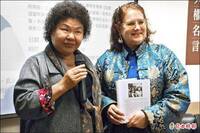《TAIPEI TIMES 焦點》 US senators present Taiwan Travel Act

U.S. Sen. Marco Rubio introduces Alex Acosta, President Donald Trump`s nominee to be Secretary of Labor, during his confirmation hearing before the Senate Health, Education, Labor, and Pensions Committee on Capitol Hill in Washington, March 22. Photo: Reuters/Aaron P. Bernstein
OBSOLETE: FAPA president Peter Chen said the proposed legislation suggests that communication channels are outdated and insufficient to maintain regional stability
/ Staff writer, with CNA
Six US senators, including Republican Marco Rubio of Florida, on Thursday jointly introduced the Taiwan Travel Act, legislation that encourages visits between Taiwan and the US at all levels.
The other senators who joined Rubio in presenting the bill were Republicans Jim Inhofe of Oklahoma and Cory Gardner of Colorado and Democrats Sherrod Brown of Ohio, Bob Menendez of New Jersey and Gary Peters of Michigan.
The draft bill states that the US Congress believes the US government should encourage visits between officials from Taiwan and the US at all levels, instead of placing restrictions on such visits.
Washington should allow US officials at all levels, including Cabinet-level national security officials, general officers and other executive branch officials, to travel to Taiwan to meet their Taiwanese counterparts, the bill reads.
The bill also says that high-level Taiwanese officials should be allowed to enter the US — under conditions which demonstrate appropriate respect for the dignity of such officials — and to meet with US officials, including officials from the US Department of State and the US Department of Defense and other Cabinet-level agencies.
In his statement introducing the legislation, Rubio underscored that “the legislation is important, especially as China attempts to block Taiwan’s participation in international organizations.”
“America should keep strengthening our relationship with Taiwan’s vibrant democracy, including by encouraging high-level visits between Taiwanese and American officials in our respective capitals,” said Rubio, a long-term supporter of Taiwan.
A member of the US Senate Taiwan Caucus, Rubio met President Tsai Ing-wen (蔡英文) in Miami on June 24 last year while Tsai was on her first overseas trip after assuming office on May 20.
Rubio proposed the bill in the Senate in September last year, but it failed to pass before the 114th Congress ended on Jan. 3.
Similar legislation was initiated by US Representative Steve Chabot, cosponsored by representatives Ed Royce and Brad Sherman, in the US House of Representatives on Jan. 13 and has been referred to the US House Committee on Foreign Affairs.
Washington-based Formosan Association for Public Affairs (FAPA) president Peter Chen (陳正義) said the Senate bill is an important signal that suggests the communication channels between Taiwan and the US are out of date and insufficient to maintain regional peace and stability.
The US should demonstrate more its support for democratic nations if it wishes to strengthen and maintain democratic development in the Asia-Pacific region, Chen said.
FAPA is a non-governmental organization devoted to promoting Taiwan-US relations and security in East Asia.
China opposes any behavior that could suggest Taiwan is a sovereign nation, including visits by senior officials to countries with which Taiwan does not have formal diplomatic relations.
Beijing has stopped official dialogue with Taiwan since Tsai, of the independence-leaning Democratic Progressive Party, became president.
Following Tsai’s refusal to heed Beijing’s calls to recognize the so-called “1992 consensus” as the sole foundation for cross-strait exchanges, China has stepped up efforts to prevent Taiwan’s participation in international organizations.
The “1992 consensus” — a term former Mainland Affairs Council chairman Su Chi (蘇起) in 2006 admitted making up in 2000 — refers to a tacit understanding between the Chinese Nationalist Party (KMT) and the Chinese government that both sides acknowledge there is “one China,” with each side having its own interpretation of what “China” means.
新聞來源:TAIPEI TIMES




















